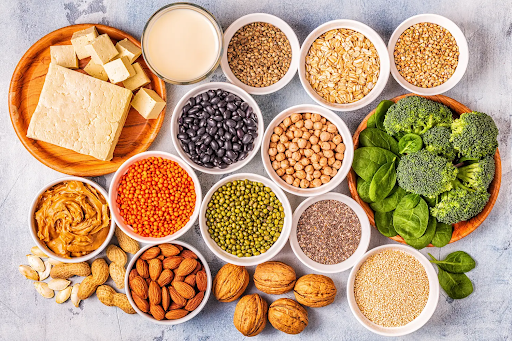3 Plant Based Beef Recipes That Will Impress Even Meat Lovers
3 Plant Based Beef Recipes That Will Impress Even Meat Lovers
Blog Article
Everything About Healthy And Balanced Food: Advantages of Enjoying Plant Based Choices
The discussion surrounding plant-based diet regimens has gained considerable focus in current years. Lots of individuals are exploring the prospective health and wellness benefits, nutritional benefits, and ecological influences connected with these dietary selections. As individuals end up being extra mindful of their food's impact on wellness and sustainability, inquiries develop about the practicalities of adopting such a lifestyle. What certain modifications can one anticipate, and exactly how might these selections reshape not only personal health and wellness yet also the earth's future?
Comprehending Plant-Based Diet Regimens
Although many individuals associate plant-based diet plans mainly with vegetarianism or veganism, these diet regimens can include a wide variety of eating patterns that focus on whole, minimally refined plant foods. Such diets frequently consist of fruits, vegetables, whole grains, seeds, legumes, and nuts, while eliminating or limiting animal products. This adaptability enables people to customize their nutritional choices according to individual choices and nutritional requirements. Some might adopt a primarily plant-based diet while still sometimes consuming meat or dairy products, typically referred to as a flexitarian strategy. The focus remains on incorporating more plant foods, which can bring about a diverse variety of dishes and tastes. Understanding these different interpretations of plant-based consuming is important for appreciating its ease of access and allure in contemporary food society.
Health And Wellness Conveniences of Plant-Based Foods
The health benefits of plant-based foods are substantial, using a nutrient density benefit that supports general health. Study indicates that these foods can enhance heart wellness and play a vital duty in effective weight management. By including extra plant-based choices, people may boost their dietary options and advertise lasting wellness.
Nutrient Thickness Advantage
Nutrient thickness plays an important function in the health and wellness advantages of plant-based foods, making them a compelling selection for those looking for a balanced diet plan. Plant-based foods, such as fruits, veggies, legumes, nuts, and entire grains, are usually abundant in important vitamins, minerals, and antioxidants while being lower in calories. This high nutrient thickness enables individuals to eat less calories while still meeting their nutritional needs. Additionally, these foods are loaded with nutritional fiber, advertising digestion health and wellness and aiding in weight administration. By integrating nutrient-dense plant-based options, consumers can improve their total health, sustain their body immune systems, and minimize the threat of chronic illness. Eventually, the nutrient density of plant-based foods underscores their importance in a health-conscious way of life.
Heart Wellness Renovation

Weight Monitoring Assistance
In addition to promoting heart wellness, a plant-based diet can considerably assist in weight monitoring. This dietary method emphasizes whole foods such as fruits, veggies, beans, nuts, and entire grains, which are typically lower in calories and greater in fiber contrasted to animal-based items. The high fiber web content assists raise satiety, minimizing total calorie consumption. Furthermore, plant-based diet plans are frequently rich in vital nutrients while low in undesirable fats, making it less complicated to preserve a healthy weight. Sugar Free Sauces. Research study indicates that people who embrace a plant-based way of life have a tendency to have reduced body mass indexes (BMIs) and experience more successful weight management compared to those who take in meat-heavy diets. Consequently, welcoming plant-based options is a calculated choice for reliable weight read review monitoring
Nutritional Worth of Plant-Based Ingredients
Plant-based active ingredients are abundant in important nutrients, using a varied variety of vitamins, minerals, and anti-oxidants that add to overall health. A comparison of healthy protein resources discloses that while pet items are typically watched as exceptional, many plant-based options offer sufficient protein and other valuable substances. Recognizing the dietary worth of these components can aid people make notified dietary options.
Important Nutrients in Plants
Nutrient-rich ingredients found in plants provide a varied range of essential vitamins and minerals that contribute greatly to general wellness. These active ingredients are rich in vitamins A, C, and K, which support immune function, vision, and blood clotting, respectively. Furthermore, plants provide vital minerals such as magnesium, potassium, and calcium, crucial for heart health, muscular tissue function, and bone toughness. The visibility of fiber in plant-based foods help digestion and advertises a healthy gut microbiome. Anti-oxidants, located generously in fruits and veggies, help combat oxidative stress and anxiety and decrease swelling. Numerous plant foods are reduced in calories yet high in nutrients, making them an exceptional option for those looking for to keep a healthy and balanced weight while ensuring suitable nutrient consumption.

Comparing Healthy Protein Sources
Healthy protein resources vary significantly in their nutritional profiles, with plant-based components supplying one-of-a-kind benefits. Unlike animal healthy proteins, which commonly include saturated fats and cholesterol, plant proteins have a tendency to be lower in these unhealthy components. Legumes, nuts, seeds, and entire grains are abundant in crucial amino acids, fiber, vitamins, and minerals. Lentils offer high healthy protein material together with substantial iron and folate, while quinoa is a total healthy protein, providing all 9 necessary amino acids. Additionally, plant-based healthy proteins are commonly gone along with by anti-oxidants and phytochemicals that support overall wellness. The shift to plant-based healthy protein sources not just improves dietary intake yet likewise aligns with lasting dietary methods, reducing ecological impact and advertising long-term health and wellness benefits.
Environmental Influence of Plant-Based Eating
As recognition of climate adjustment grows, lots of people are checking out lasting dietary options that can greatly minimize their ecological impact. Plant-based eating has actually become a significant contributor to lowering greenhouse gas exhausts, which are largely related to animals manufacturing. The cultivation of fruits, grains, veggies, and beans typically needs less sources, such as water and land, contrasted to animal farming. Furthermore, plant-based diet plans can bring about decreased deforestation, as less land is needed for grazing animals or growing pet feed. By moving towards plant-based alternatives, customers can sustain biodiversity and advertise healthier environments. Overall, accepting plant-based eating not only advantages personal health however likewise stands for a vital step toward environmental sustainability and preservation efforts.
Overcoming Common Misconceptions
While several individuals recognize the advantages of a plant-based diet, several mistaken beliefs usually deter them from fully embracing this lifestyle. A typical idea is that plant-based diet plans do not have adequate protein; however, various plant sources, such as legumes, nuts, and tofu, supply ample healthy protein. In addition, some think that this diet plan is costly, when as a this matter of fact, staples like beans, rice, and seasonal vegetables can be fairly inexpensive. Another misconception is that plant-based consuming is excessively limiting, whereas it really provides a varied selection of flavors and foods. Ultimately, several fret that a plant-based diet might cause deficiencies, yet with proper planning, individuals can get all needed nutrients, including vitamins and minerals, while appreciating a wide array of scrumptious meals.
Tips for Transitioning to a Plant-Based Way of living
Making the shift to a plant-based way of living can be an enhancing experience, though it often needs some guidance to navigate the first modifications. Initially, individuals are motivated to begin gradually, integrating even more fruits, vegetables, vegetables, and entire grains into their dishes while reducing meat and dairy products intake. Meal planning is crucial; preparing a weekly menu can assist reduce the change and stop final harmful choices. Checking out brand-new dishes and cooking approaches can also improve the experience and preserve excitement about plant-based eating. Furthermore, joining support system or areas can give inspiration and share valuable tips. Staying informed about nutrition warranties well balanced meals, stopping deficiencies while fostering a healthy, satisfying plant-based lifestyle.

Delicious Plant-Based Dish Ideas
Discovering delicious plant-based dish concepts can inspire individuals to welcome a more healthy diet regimen. One popular choice is a passionate quinoa salad, featuring cherry tomatoes, cucumber, and a tangy lemon-tahini clothing. An additional favorite is a mouthwatering lentil stew, packed with carrots, celery, and fragrant natural herbs, excellent for a reassuring dinner. For breakfast, overnight oats made with almond milk, chia seeds, and topped with fresh berries give a nutritious start to the day. Furthermore, a vivid veggie stir-fry with tofu and a variety of vibrant veggies can be a quick yet pleasing dish. Ultimately, creamy avocado toast on whole-grain bread, sprinkled check that with seeds and flavors, supplies a simple yet tasty snack. These meals showcase the range and splendor of plant-based consuming.

Often Asked Questions
Can a Plant-Based Diet Regimen Supply Sufficient Protein?
The question of whether a plant-based diet regimen can offer sufficient healthy protein prevails. Various resources, including legumes, nuts, seeds, and entire grains, can meet healthy protein needs effectively, sustaining a balanced and nourishing diet plan for people.
Are Plant-Based Diet Plans Suitable for Kid?
The suitability of plant-based diet plans for children depends upon careful preparation. Adequate nutrients need to be guaranteed, consisting of minerals, healthy proteins, and vitamins. With appropriate guidance, such diet plans can support healthy development and growth in children.
Exactly how Do I Eat Out on a Plant-Based Diet plan?
Eating in restaurants on a plant-based diet includes seeking dining establishments with diverse menus, requesting for modifications, and checking out vegan-friendly alternatives. Planning ahead and connecting nutritional preferences can improve the eating experience while maintaining dietary options.
What Prevail Allergens in Plant-Based Foods?
Common allergens in plant-based foods consist of soy, gluten, nuts, and seeds - Plant Based Chicken. People adhering to a plant-based diet ought to know these irritants and review tags carefully to prevent negative responses and guarantee safe usage
Can Plant-Based Diets Aid With Weight Loss?
Research indicates that embracing a plant-based diet plan may assist in fat burning as a result of its generally lower calorie density and higher fiber content. This combination can enhance satiety, helping individuals manage their calorie consumption properly. Several individuals link plant-based diet regimens mostly with vegetarianism or veganism, these diet regimens can encompass a large variety of eating patterns that prioritize whole, minimally refined plant foods. Nutrient thickness plays a crucial duty in the wellness advantages of plant-based foods, making them a compelling choice for those seeking a well balanced diet regimen. Plant-based diet plans have been shown to markedly boost heart wellness, as they commonly contain elements that sustain cardio feature. In addition to promoting heart health, a plant-based diet plan can considerably assist in weight monitoring. A typical belief is that plant-based diet regimens lack sufficient healthy protein; nevertheless, various plant resources, such as vegetables, nuts, and tofu, offer ample healthy protein.
Report this page